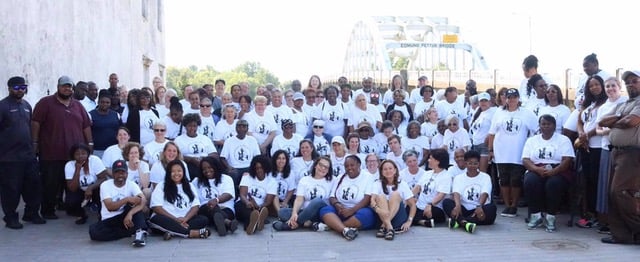Dear Evanston organizes trip to engage with the history of slavery
Evanston residents with the group Dear Evanston taking a picture before crossing the Edmund Pettus Bridge in Selma, Alabama. Residents joined Dear Evanston on an “uncomfortable journey” to Montgomery, Alabama.
September 29, 2019
Nearly 100 Evanston residents boarded busses to take “An Uncomfortable Journey” to Montgomery, Alabama in order to learn about and confront the history of racial injustice in the United States.
During the trip, which ran from Sept. 13 to Sept. 15, they visited the Legacy Museum: From Enslavement to Mass Incarceration and National Memorial for Peace and Justice. Organized by Dear Evanston, a community activism organization, and sponsored by Evanston Cradle to Career, Evanston Community Foundation and the Evanston/North Shore Branch NAACP, the trip sought to help visitors “confront the past and commit to challenging racial injustice today,” said the organization’s co-founder Nina Kavin.
Kavin said she organized the trip to work toward Dear Evanston’s goals of building bridges and promoting racial equity. The Legacy Museum displays the history of slavery, racial segregation and the marginalization of people of color, and the memorial recognizes enslaved black people and people terrorized by racial inequalities.
“I wanted this to be a trip where white people could bear witness to the brutality that was committed against African Americans,” Kavin said. “For African-American people, this is probably a journey of witnessing their ancestral history. As a group, we all had a unique experience.”
When Kimberly Holmes-Ross, one of the members on the organizing team, heard about the trip, she said she thought it was important but worried it wouldn’t be accessible to community members of all backgrounds because of either lack of knowledge or funds.
Holmes-Ross, who works as the Community Engagement Coordinator for Evanston Cradle to Career, used her experience to spread the word to minority communities who she said normally don’t hear about these types of events. Dear Evanston organized a bus trip to make it an affordable way of travel for those from lower-income backgrounds, so people who wanted to go were able to. Holmes-Ross said these efforts matched the results she was hoping to achieve.
“I really got a good look of what I feel like Evanston looks like on those busses,” Holmes-Ross said.
She said the bus had about 40 white participants, 50 who identified as black. Others identified with different ethnicities. The age of those travelling ranged from 18 to 80.
One of the youngest members on the trip was Ashanti Cole-Stallworth, who is a senior at Evanston Township High School. She said she gained a lot from the museum and memorial. Though she is still digesting what she saw and heard, she learned to be more open-minded and dig deeper into history and learning about others.
“It’s just a whole new experience, and I think people need to travel more and have more experiences like this,” Cole-Stallworth said.
As a community organizer, Holmes-Ross said she hopes that this trip can be a model for others to give this experience to everyone but especially students who lack the in-depth education about black history that the Legacy museum provides.
Kavin said she wants to consult other groups to take this trip as well.
“Every single one of us needs to know this history,” Kavin said. “And until there’s a museum and memorial like this in every city in America, we need to make pilgrimages to learning and confronting our past in order to move to a better future.”
Email: [email protected]
Twitter: @kalenluciano
Related Stories:
—Local artist tells family migration story from Alabama to Evanston in ‘Up from Down Home’ exhibit
—Evanston Organizes: 8,000 likes later, social media campaign now a central source of community activism


